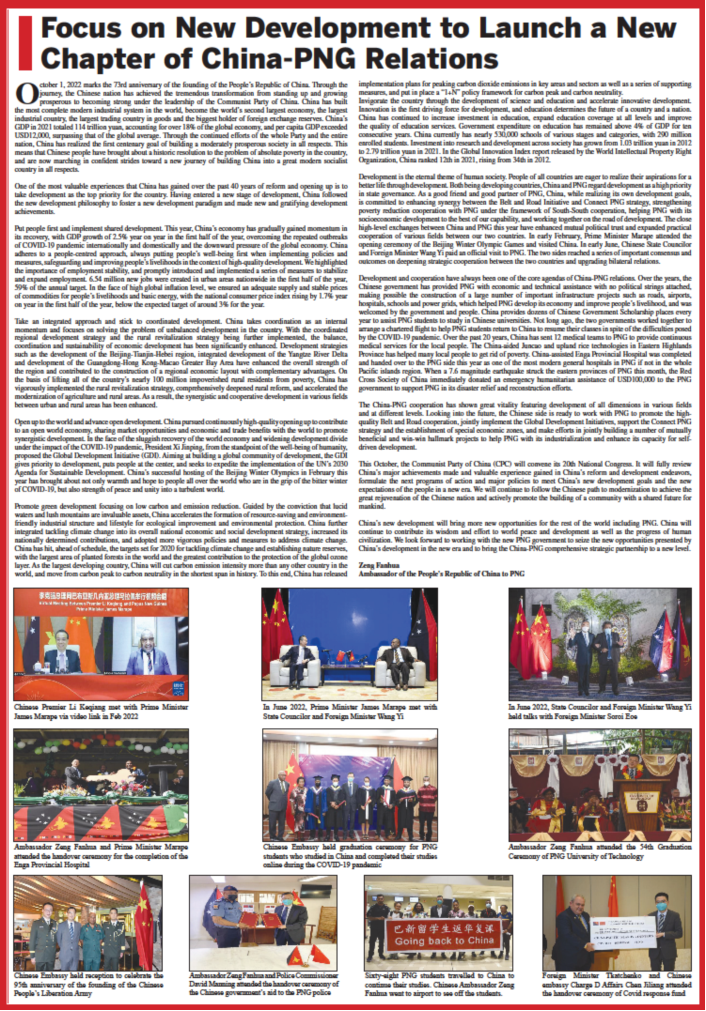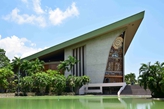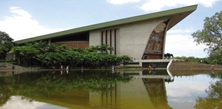On September 30, H.E. Ambassador Zeng Fanhua wrote an article entitled “Focus on New Development to Launch a New Chapter of China-PNG Relations” on Post Courier and the National, celebrating the 73rd anniversary of the founding of the People’s Republic of China. The full text is as follows:

October 1, 2022 marks the 73rd anniversary of the founding of the People’s Republic of China. Through the journey, the Chinese nation has achieved the tremendous transformation from standing up and growing prosperous to becoming strong under the leadership of the Communist Party of China. China has built the most complete modern industrial system in the world, become the world’s second largest economy, the largest industrial country, the largest trading country in goods and the biggest holder of foreign exchange reserves. China’s GDP in 2021 totaled 114 trillion yuan, accounting for over 18% of the global economy, and per capita GDP exceeded USD12,000, surpassing that of the global average. Through the continued efforts of the whole Party and the entire nation, China has realized the first centenary goal of building a moderately prosperous society in all respects. This means that Chinese people have brought about a historic resolution to the problem of absolute poverty in the country, and are now marching in confident strides toward a new journey of building China into a great modern socialist country in all respects.
One of the most valuable experiences that China has gained over the past 40 years of reform and opening up is to take development as the top priority for the country. Having entered a new stage of development, China followed the new development philosophy to foster a new development paradigm and made new and gratifying development achievements.
Put people first and implement shared development. This year, China’s economy has gradually gained momentum in its recovery, with GDP growth of 2.5% year on year in the first half of the year, overcoming the repeated outbreaks of COVID-19 pandemic internationally and domestically and the downward pressure of the global economy. China adheres to a people-centred approach, always putting people’s well-being first when implementing policies and measures, safeguarding and improving people’s livelihoods in the context of high-quality development. We highlighted the importance of employment stability, and promptly introduced and implemented a series of measures to stabilize and expand employment. 6.54 million new jobs were created in urban areas nationwide in the first half of the year, 59% of the annual target. In the face of high global inflation level, we ensured an adequate supply and stable prices of commodities for people’s livelihoods and basic energy, with the national consumer price index rising by 1.7% year on year in the first half of the year, below the expected target of around 3% for the year.
Take an integrated approach and stick to coordinated development. China takes coordination as an internal momentum and focuses on solving the problem of unbalanced development in the country. With the coordinated regional development strategy and the rural revitalization strategy being further implemented, the balance, coordination and sustainability of economic development has been significantly enhanced. Development strategies such as the development of the Beijing-Tianjin-Hebei region, integrated development of the Yangtze River Delta and development of the Guangdong-Hong Kong-Macao Greater Bay Area have enhanced the overall strength of the region and contributed to the construction of a regional economic layout with complementary advantages. On the basis of lifting all of the country’s nearly 100 million impoverished rural residents from poverty, China has vigorously implemented the rural revitalization strategy, comprehensively deepened rural reform, and accelerated the modernization of agriculture and rural areas. As a result, the synergistic and cooperative development in various fields between urban and rural areas has been enhanced.
Open up to the world and advance open development. China pursued continuously high-quality opening up to contribute to an open world economy, sharing market opportunities and economic and trade benefits with the world to promote synergistic development. In the face of the sluggish recovery of the world economy and widening development divide under the impact of the COVID-19 pandemic, President Xi Jinping, from the standpoint of the well-being of humanity, proposed the Global Development Initiative (GDI). Aiming at building a global community of development, the GDI gives priority to development, puts people at the center, and seeks to expedite the implementation of the UN’s 2030 Agenda for Sustainable Development. China’s successful hosting of the Beijing Winter Olympics in February this year has brought about not only warmth and hope to people all over the world who are in the grip of the bitter winter of COVID-19, but also strength of peace and unity into a turbulent world.
Promote green development focusing on low carbon and emission reduction. Guided by the conviction that lucid waters and lush mountains are invaluable assets, China accelerates the formation of resource-saving and environment-friendly industrial structure and lifestyle for ecological improvement and environmental protection. China further integrated tackling climate change into its overall national economic and social development strategy, increased its nationally determined contributions, and adopted more vigorous policies and measures to address climate change. China has hit, ahead of schedule, the targets set for 2020 for tackling climate change and establishing nature reserves, with the largest area of planted forests in the world and the greatest contribution to the protection of the global ozone layer. As the largest developing country, China will cut carbon emission intensity more than any other country in the world, and move from carbon peak to carbon neutrality in the shortest span in history. To this end, China has released implementation plans for peaking carbon dioxide emissions in key areas and sectors as well as a series of supporting measures, and put in place a “1+N” policy framework for carbon peak and carbon neutrality.
Invigorate the country through the development of science and education and accelerate innovative development. Innovation is the first driving force for development, and education determines the future of a country and a nation. China has continued to increase investment in education, expand education coverage at all levels and improve the quality of education services. Government expenditure on education has remained above 4% of GDP for ten consecutive years. China currently has nearly 530,000 schools of various stages and categories, with 290 million enrolled students. Investment into research and development across society has grown from 1.03 trillion yuan in 2012 to 2.79 trillion yuan in 2021. In the Global Innovation Index report released by the World Intellectual Property Right Organization, China ranked 12th in 2021, rising from 34th in 2012.
Development is the eternal theme of human society. People of all countries are eager to realize their aspirations for a better life through development. Both being developing countries, China and PNG regard development as a high priority in state governance. As a good friend and good partner of PNG, China, while realizing its own development goals, is committed to enhancing synergy between the Belt and Road Initiative and Connect PNG strategy, strengthening poverty reduction cooperation with PNG under the framework of South-South cooperation, helping PNG with its socioeconomic development to the best of our capability, and working together on the road of development. The close high-level exchanges between China and PNG this year have enhanced mutual political trust and expanded practical cooperation of various fields between our two countries. In early February, Prime Minister Marape attended the opening ceremony of the Beijing Winter Olympic Games and visited China. In early June, Chinese State Councilor and Foreign Minister Wang Yi paid an official visit to PNG. The two sides reached a series of important consensus and outcomes on deepening strategic cooperation between the two countries and upgrading bilateral relations.
Development and cooperation have always been one of the core agendas of China-PNG relations. Over the years, the Chinese government has provided PNG with economic and technical assistance with no political strings attached, making possible the construction of a large number of important infrastructure projects such as roads, airports, hospitals, schools and power grids, which helped PNG develop its economy and improve people’s livelihood, and was welcomed by the government and people. China provides dozens of Chinese Government Scholarship places every year to assist PNG students to study in Chinese universities. Not long ago, the two governments worked together to arrange a chartered flight to help PNG students return to China to resume their classes in spite of the difficulties posed by the COVID-19 pandemic. Over the past 20 years, China has sent 12 medical teams to PNG to provide continuous medical services for the local people. The China-aided Juncao and upland rice technologies in Eastern Highlands Province has helped many local people to get rid of poverty. China-assisted Enga Provincial Hospital was completed and handed over to the PNG side this year as one of the most modern general hospitals in PNG if not in the whole Pacific islands region. When a 7.6 magnitude earthquake struck the eastern provinces of PNG this month, the Red Cross Society of China immediately donated an emergency humanitarian assistance of USD100,000 to the PNG government to support PNG in its disaster relief and reconstruction efforts.
The China-PNG cooperation has shown great vitality featuring development of all dimensions in various fields and at different levels. Looking into the future, the Chinese side is ready to work with PNG to promote the high-quality Belt and Road cooperation, jointly implement the Global Development Initiatives, support the Connect PNG strategy and the establishment of special economic zones, and make efforts in jointly building a number of mutually beneficial and win-win hallmark projects to help PNG with its industrialization and enhance its capacity for self-driven development.
This October, the Communist Party of China (CPC) will convene its 20th National Congress. It will fully review China’s major achievements made and valuable experience gained in China’s reform and development endeavors, formulate the next programs of action and major policies to meet China’s new development goals and the new expectations of the people in a new era. We will continue to follow the Chinese path to modernization to achieve the great rejuvenation of the Chinese nation and actively promote the building of a community with a shared future for mankind.
China’s new development will bring more new opportunities for the rest of the world including PNG. China will continue to contribute its wisdom and effort to world peace and development as well as the progress of human civilization. We look forward to working with the new PNG government to seize the new opportunities presented by China’s development in the new era and to bring the China-PNG comprehensive strategic partnership to a new level.











